Edie Melson's Blog, page 171
February 27, 2021
What makes a Christian blog successful?

by Sue Schlesman @SueSchlesman
If you’re a writer, you probably have a blog. Or you’re thinking about writing a blog. Or you’re overwhelmed managing it. Or you’ve given up. Or maybe, you’re doing so well, your posts are going viral. (If so, I’d like to talk to you.)
Blogs can feel like an enormous amount of extra work for decidedly right-brained “just let me do my art” kind of people. We wish that social media/platform-building wasn’t a thing, but it is. I have two blogs, and I have a love-hate relationship with both of them. I always feel like I should be doing more and that I’m not successful at either one. And yet, I love the writing platform, and I love the readers.
Herein lies the all-important question for those of us who blog our hearts out: What makes a Christian blog successful?
I’m not going to speak about numbers. Many experts can inform you about desired numbers for subscribers or analytics. I’d like to talk about a different kind of success--personal, spiritual success. You must measure your blog’s success by the interactions you have and the people you touch.
Recently when I clicked on the “comments” section of both of my blogs, I realized I had several comments sitting there awaiting moderation. (By the way, you should always respond to a comment on your blog. That’s Blogging Etiquette 101.) I guess I’d forgotten to check for a couple days.
My readers contact me through blog comments or personal email. They might share heartbreak, a request for counsel, or even harsh disagreement. Regardless of the style and tone of their communication, they are willing to engage in conversation. And conversation—real communication—forms the backbone of a successful blog.
As the moderator of your own blog, you can choose to approve, reply, trash, or spam any comment that comes in. In general, I approve anything that’s not solicitous or suspicious, even if a response is negative toward me. I do not allow comments that are prejudiced toward a people group or inflammatory against faith and God. Questioning faith is good; defaming God is not something I want on my blog for two reasons: 1) I don’t want to give the argument a platform; 2) I don’t want to argue/debate that person on a public forum. I will, however, email back and attempt to have a grace-filled discussion with someone who disagrees. As long as the reader can converse, rather than attack, I will continue the conversation.
How to respond to comments on your blog
1. Thank the reader for his/her comment, whether it’s critical or complimentary. Someone took the time to read what you wrote and write back. Show appreciation.
2. Answer any question he/she asked if it’s a simple answer that benefits your readers as a whole. Don’t assume you always communicate what you’re thinking. Looking at your writing through another person’s eyes is invaluable. Try to see what they saw and clarify your writing.
3. If a reader shows strong interest in a particular topic or asks for more information, share links, book recommendations, or articles in the comment section so everyone can benefit from the information. This also shows you care enough to treat each reader personally.
4. Email your reader if he/she shares something personal, attacks you personally, or posts a lengthy comment that requires a significant response. Take the time to have the conversation. You may win someone to Christ or at least open the door to truth.
5. If you feel you must cut off communication with someone, kindly respond, explain why the debate or discussion is unproductive, and inform him/her that you will not continue the conversation any longer. You can unsubscribe any of your readers if you think it’s necessary for the benefit of the whole.
Just this week, I’ve heard from a Middle Eastern Christian woman married to a Muslim man who won’t allow her to practice her faith. I’ve heard from an angry reader who misinterpreted my heart over issues of justice and mercy. I’ve been thanked for sharing about my own grief because my blog comforted a grieving reader. People have shared how God spoke to them through a prayer I wrote. The reaching out from writer to reader and back again is a gift and a responsibility.
My blogs are not particularly successful by industry standards, yet they bring responses from people all over the country and the world. People ask about faith. About hope. About recovery. For prayer.
That’s success. And all of us can have this kind of success. We can all write what we feel, explain how God heals, and reach into cyberspace and give comfort freely.
If you feel called to write a blog—and you write it to the glory of God—you are a successful Christian blogger. Christian writing on any forum requires faith and courage. We must be in tune with the Holy Spirit so we know what to say, and perhaps more importantly, what not to say to an audience made up of strangers as well as friends. Believers and unbelievers. Seekers and critics.
Blogging as a ministry doesn’t mean your SEO isn’t important. It is. Let’s just not confuse spiritual impact with market success.
TWEETABLE
What Makes a Christian Blog Successful? @SueSchlesman on @EdieMelson (Click to Tweet)
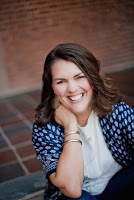 Sue Schlesman is an award-winning author, speaker, blogger, English teacher, and pastor’s wife. Her second book, Soulspeak: Praying Change into Unexpected Places, won a Selah Award in 2020. Sue was also a top-15 contributor at Crosswalk.com in 2020. Sue has a BA in Creative Writing and a Master’s in Theology & Culture. Her material appears in a variety of print, online, radio, and podcast mediums. She has a passion for poetry, missions, justice, traveling, reading, and the local church. You can find her writing about life, education, and Jesus at sueschlesman.com.
Sue Schlesman is an award-winning author, speaker, blogger, English teacher, and pastor’s wife. Her second book, Soulspeak: Praying Change into Unexpected Places, won a Selah Award in 2020. Sue was also a top-15 contributor at Crosswalk.com in 2020. Sue has a BA in Creative Writing and a Master’s in Theology & Culture. Her material appears in a variety of print, online, radio, and podcast mediums. She has a passion for poetry, missions, justice, traveling, reading, and the local church. You can find her writing about life, education, and Jesus at sueschlesman.com.
February 26, 2021
Creating Heroes: Ten Ways to Reveal the Heroic Qualities of Your Character in Story
Edie here. I wish you could see me—I'm almost jumping up and down from excitement. I have managed to convince filmmaker and story teller extraordinaire, Zena Dell Lowe to join The Write Conversation as a regular contributor. Hopefully many of you are already familiar with her informative Podcast, The Storyteller's Mission. I met Zena years ago when we were both on staff at a writers conference and know first hand her talent for teaching. So please join me in a warm TWC welcome!

Creating Heroes: Ten Ways to Reveal the Heroic Qualities of Your Character in Storyby Zena Dell Lowe @ZenaDellLoweOne of the things that's really important for you to learn as a writer is how to create heroic characters. With only a few exceptions, your main character becomes the hero of your story. Therefore, it’s your job to show the audience that they are genuinely heroic. But that begs the question, how, exactly, can that be accomplished? How do you reveal to the audience the noble qualities of a hero that your main character ought to possess?
The following list identifies 10 things that you can do as a writer to help reveal the character qualities that a true hero must possess. This list is by no means exhaustive. However, it should at least get your imagination working. Today, we’ll discuss the first five.
1. Put them in high pressure situations and force them to take action.
On my podcast, The Storyteller's Mission with Zena Dell Lowe, I've talked about the fact that true character is revealed by the choices a person makes under pressure. When your main character is placed in a high-pressure situation, how does she react? Does she crumble under the weight of it or does she rise to the occasion? The key is to construct scenarios that force them to think fast on the fly, which in turn allows us to see what they're really like on the inside. Do they have what it takes? Are they ultimately selfless and brave? Or do we discover that deep down, they are really selfish and cowardly? People are like grapes—when you squeeze them, you see what's on the inside. Consequently, the number one way to reveal noble character qualities in your story is to put your character into extremely stressful situations and let us see how they react under pressure.
2. Make them think outside of the box.
As your story ramps up to the ultimate climax and final conflict, your character will inevitably offer some sort of solution to hopefully save the day. But whatever solution they offer, it shouldn't be one that we, the audience, would think of ourselves. In fact, it shouldn't even occur to us. Think about Captain Kirk, played by Chris Pine in the new reboot of the Star Trek franchise. We regularly observe Captain Kirk suggesting things that the others on the Starship Enterprise regard as sheer madness. But the whole reason why Captain Kirk is the right man for the job is precisely because he thinks outside of the box. He comes up with plans that nobody else would ever think of, and so should our characters.
3. Force them to stuff their personal issues for the good of others, or for the greater good.
For example, maybe they have to work with an enemy or a former love interest against whom they have a personal grudge. However, whatever’s happening in the “real world” of the story is ultimately bigger than your character’s grudge, so he has to set aside his personal grievances in order to face the bigger conflict. When you create a situation that forces your character to have to temporarily ignore or stuff his or her own wants and desires, it ups the stakes of your story, and it puts even more pressure on your characters. Sometimes, it can even add a level of humor or emotional intensity to the story. After all, there’s only so much a character can take!
4. No matter how bad it gets, they do the right thing in the right way.
For example, if you have a character that's bringing a bad guy to justice, he needs to do it in a manner that is consistent with his respect for the dignity of the other person's humanity, in spite of all the bad things that the bad guy might have done. Your main character can take satisfaction from the fact that he's bringing a bad character to justice, but he can never take a perverted pleasure in it for himself. In other words, a hero’s motives ought to be pure, or if they’re not, he needs to realize this and be struggling inside of himself with this issue. The bottom line is that to truly be heroic, your character can't be doing his job out of some kind of selfish motivation, like wanting glory or revenge or to get career props or whatever the case may be. He needs to be doing whatever he's doing because it's the right thing to do. Otherwise, he ceases to be heroic.
5. Give your character something noble to believe in.
Your heroic characters must have a cause greater than themselves. They must be guided by something that goes beyond their own personal desires or feelings. Even John Wick was forced to adhere to “the rules” of the high table. There need to be principles in the world of your story that are bigger than the character himself. Otherwise, everything he does will inevitably be self-righteous. But when they have true guiding principles (like the ones we have in Scripture, but even the rules in John Wick will do), your character’s submission to those principles in spite of their own personal feelings or inner conflicts makes them even more noble in our sight. They need to have something bigger to believe in than just their own personal feelings.
Part 2 of this post will cover the next 5 on the list, so check back here next week for the conclusion of this topic. In the meantime, if you’re interested in getting more tips like this, check out The Storyteller's Mission with Zena Dell Lowe, a podcast for artists and storytellers about changing the world for the better through story. New episodes are available every Thursday on the podcast app of your choice.
Also, check out the new The Storyteller's Mission online platform, where you can find various services for writers, including online classes, coaching opportunities and manuscript and screenplay critiques. Just go to www.thestorytellersmission.com for more information.
Until then, may you go forth inspired to change the world for the better through story.
TWEETABLECreating Heroes: Ten Ways to Reveal the Heroic Qualities of Your Character in Story - @ZenaDellLowe on @EdieMelson (Click to Tweet)
 Zena Dell LoweAward-winning Filmmaker, Speaker, Teacher, Story Coach, and Podcast Host
Zena Dell LoweAward-winning Filmmaker, Speaker, Teacher, Story Coach, and Podcast Host Zena has worked professionally in the entertainment industry for over 20 years as a writer, producer, director, actress, and story consultant. Zena also teaches advanced classes on writing all over the country. As a writer, Zena has won numerous awards for her work. She also has several feature film projects in development through her independent production company, Mission Ranch Films. In addition to her work as a filmmaker, Zena launched The Storyteller’s Mission with Zena Dell Lowe, a podcast designed to serve the whole artist, not just focus on craft. In 2021, Zena launched The Storyteller’s Mission Online Platform, where she offers advanced classes and other key services to writers. Zena loves story and loves to support storytellers. Her passion is to equip artists of all levels to achieve excellence at their craft, so that they will truly have everything they need to change the world for the better through story.
To find out more about Zena or her current courses and projects, check out her websites at www.missionranchfilms.comand www.thestorytellersmission.com
February 25, 2021
How God Orchestrates the Events of Our Writing Life—The Mystery of the Open Door

By Lori Hatcher @LoriHatcher2
Do you ever pray for God to “open the door” in your publishing life? I do. Every day.
“Lord, open the door for this article to be published.”
“Lord, open the door for me to write/speak/teach/serve or ______(fill in the blank).”
“Lord, open the door for someone to publish my book.”
What exactly does it look like when God opens a door? In its most heavenly form, it means that God, out of nowhere and with no effort on our part, drops an incredible opportunity into our lap that we could never have engineered, fenagled, or coerced.
Scott Hubbard, in his article, “Walk in His Providence, How God Opens Doors for You,” writes, “Some of us live as though providence were something only to react to. We wait for a clear, providential open door, and then we react to that providence by walking through the doorway.”
In its most realistic and common form, however, God’s open doors are directly related to the effort we expend. “God has planned,” Hubbard continues, “for some doors to open only as we push them.”
This approach is biblical. Paul prayed, then headed off to Bithynia, where the door remained closed. He prayed and diverted to Troas. There he received a vision that directed him to Macedonia, where God opened the door for him to preach the gospel and plant the church at Philippi.
Sadly, many of us, as Hubbard writes, “. . . sit in the hallway of life, waiting until a divine hand should swing a door open and push us through it.”
In most cases, this isn’t the way the writing world works. God expects us to walk the hallways, prayerfully seeking His direction and doing the work He leads us to do, until we arrive at the door He intends to open. With our arms full of experience, skill, and strength of character, we nudge the door and watch it swing open.
If it doesn’t, we head off down the hallway again, confident that, in the fullness of time, when we’ve learned the lessons, acquired the skills, and polished our writing ‘til it shines, we’ll turn the next (or the next, or the next) handle, and the door will swing wide.
Every open door I’ve experienced in my writing life has come about because I’ve prayed, sought God’s direction, and done the work.
A magazine published my first article after I wrote and rewrote it a dozen times, then submitted it for consideration.
I received an invitation to speak at a government agency’s annual conference after I joined a writers group and happened to meet the organization’s deputy director.
The editor of Reach Out, Columbia magazine recommended me as her successor after I’d written for her (sometimes without pay) for three years.
I was invited to teach at a writers conference after submitting workshop proposals every year for five years.
I received a contract for Refresh Your Faith, Uncommon Devotions from Every Book of the Bible, after revising and reworking a proposal that had been rejected by 25 publishers.
Ask successful writers about their journey, and you’ll hear a similar story. Sometimes God swings open a door we never see until we’re standing in front of it. Most of the time, He pairs our human effort with His divine providence to accomplish His perfect will.
Writer, we have blog posts to create, articles to write, and book proposals to submit. How will we know if God intends to open the publishing door for any of these?
We’ll pray, work hard, and turn the handle.
TWEETABLE
 Lori Hatcher loves God even more than she loves chocolate—and that’s a lot. Since He saved her at age 18, she’s been on a relentless journey to know and love Him more. Her deepest desire is for her others to join her on the journey. As an author, blogger, and women’s ministry speaker, she writes for Our Daily Bread, Guideposts, Revive Our Hearts, and Crosswalk.com. She’s written three devotional books, including
Refresh Your Faith, Uncommon Devotions from Every Book of the Bible
, and
Hungry for God…Starving for Time, Five-Minute Devotions for Busy Women
. Connect with her at LoriHatcher.com or on Facebook, Twitter (@lorihatcher2) or Pinterest (Hungry for God).
Lori Hatcher loves God even more than she loves chocolate—and that’s a lot. Since He saved her at age 18, she’s been on a relentless journey to know and love Him more. Her deepest desire is for her others to join her on the journey. As an author, blogger, and women’s ministry speaker, she writes for Our Daily Bread, Guideposts, Revive Our Hearts, and Crosswalk.com. She’s written three devotional books, including
Refresh Your Faith, Uncommon Devotions from Every Book of the Bible
, and
Hungry for God…Starving for Time, Five-Minute Devotions for Busy Women
. Connect with her at LoriHatcher.com or on Facebook, Twitter (@lorihatcher2) or Pinterest (Hungry for God).
February 24, 2021
Carpe Diem Writers

by Henry McLaughlin @RiverBendSagas
Are you like me? Does every day start with a list of things that have to must be done? Many people can get through their day with a mental list. I’m not one of them. I need my written list. After it’s written, I need to set the proper priorities.
And then stuff happens. Some are simple distractions like Facebook, research that takes us down rabbit trails, Instagram, Twitter.
Or we discover we’re missing a vital ingredient for supper, and we have to visit three stores to find it. Or the boss asks us to work late a half-hour to finish a project, and two hours later we’re still working on it.
Sometimes, the unexpected comes up. A neighbor stops by. Aunt Millie from Minnesota calls and gives us every detail of her bunion surgery. The car gets a flat. The sink backs up.
Let’s not forget emergencies. One of the kids gets sick and has to be fetched from school and maybe taken to the doctor or emergency room.
We only have so much time. Sometimes we can’t control what happens to it. But we need to work on spending our time wisely.
Every day begs to be seized. Do we seize the day, or do we let the day seize us?
I’d like to think I seize the day through my calendar and my to-do list. But too often the day gets away from me.
When the day unravels, there’s a scripture verse that reminds me of a way to not lose: Therefore, brothers, by the mercies of God, I urge you to present your bodies as a living sacrifice, holy and pleasing to God; this is your spiritual worship. Do not be conformed to this age, but be transformed by the renewing of your mind, so that you may discern what is the good, pleasing, and perfect will of God. Romans 12:1-2 (HCSB)
When I let him renew my mind, the stuff circling my head like turkey buzzards, the tasks all demanding immediate action fall into order. His word sharpens my mind, heart, and soul. Scripture reassures me that change will happen. Order will come.
When I stop and renew my mind in his peace, it lets him guide me into what needs to be my priority, what I can postpone, and, believe it or not, what doesn’t have to be accomplished at all. At least by me.
The day can still feel hectic, but it doesn’t feel out of control anymore. And the most important things get done because he reveals his good, pleasing and perfect will for me.
What do you do when your day threatens to spin out of control?
TWEETABLECarpe Diem Writers - inspiration from Henry McLaughlin @RiverBendSagas on @EdieMelson (Click to Tweet)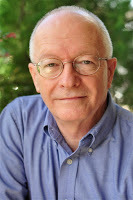 Henry’s debut novel, Journey to Riverbend, won the 2009 Operation First Novel contest.
Henry’s debut novel, Journey to Riverbend, won the 2009 Operation First Novel contest.Henry edits novels, leads critique groups, and teaches at conferences and workshops. He enjoys mentoring and coaching individual writers.
Connect with Henry on his BLOG, TWITTER and FACEBOOK.
February 23, 2021
Facebook Changes February 2021, What's A Writer to do with Facebook Now?

by Edie Melson @EdieMelson
By now everyone has heard about the most recent changes in Facebook. A lot of you have reached out, asking for advice on how writers should move forward with social media. Here's the most important piece of advice I can give you...
Don't Panic!
I have talked to some authors and writers who have heard about a significant drop in visibility, but I haven't yet spoken to anyone who's seen major issues. This does NOT mean there aren't those who are affected, just that I don't have personal contact with any of them. I'm sure that will change. How an author is affected appears to be directly related to their philosophy about how to use Facebook.
Before I give you my opinion about where to go from here, let's back up and make sure we're on the same page about how I view social media in general and Facebook specifically.
IMPORTANT NOTE: I use social media as a way to build connections and funnel people to my email subscription list. Your email list must ALWAYS be the primary way you connect with your readers. Social media is critical to help me find new people to connect with, but it is NOT the basis of my platform or the way I primarily engage with those people. For that I have my blog and my email list.
An Effective Social Media Strategy for Facebook
I build my Facebook social media on two foundational precepts (and the first is a foundation for every online interaction I have):
I see social media primarily as a ministry and a way to make connections. Although I do some minor advertising, it’s very minimal. I rarely boost posts.My primary goal for interacting on Facebook is to be valuable to those who read my posts and make certain every post has good engagement.The Goal of Facebook
Before we can create an effective strategy for Facebook, we have to know what Facebook wants to accomplish. By knowing that, we can work with this platform, instead of against it.
What does Facebook Want? This platform has been fairly open about its goal for those who are on Facebook. They want users to have positive, meaningful interactions on Facebook.
So in a nutshell the algorithm Facebook uses is designed to measure how likely it is that a specific user will have a positive experience with each specific post. Of course there is a complicated and secret equation (the algorithm) used to determine that.
A little history…
In 2018, Mark Zuckerberg started talking about making Facebook more meaningful. He outlined a general process that would prioritize posts from family and friends as opposed to businesses. (here’s a link to the entire article https://about.fb.com/news/2018/01/new...). When this came out, many panicked because they thought it meant they’d have less visibility.
BUT, as long as authors and writers made sure they were sharing engaging and meaningful posts, we all saw that visibility didn’t have to diminish.
The 2021 Facebook Algorithm
Facebook has refined the algorithm and is now even more passionate about users seeing posts that matter to them.
So how do we share content that’s meaningful? I’m so glad you asked!
There are 4 criteria that Facebook uses to determine the value of a post
Inventory (this is all the posts available to that specific user at that time)Signals (this is how your post is put together, including open-ended questions, no false news or engagement baiting, as well as the type of content you’re sharing, such as video, image, text, advertising, etc).Prediction (this is how Facebook believes a specific user will react to the post).Relevancy score (this is the rank assigned to a specific post and determines where a post will fall in the newsfeed).Out of these criteria, there is only one we can control. We can control the SIGNALS part of the equation. To make this part of the equation work for us, we must evaluate how to share meaningful content within the context of what Facebook allows.
Meaningful Content
Here are some of the things I do to create meaningful engagement on Facebook:Share updates that encourage conversations and shares.Know the FACEBOOK rules of engagement and follow them. Avoid engagement baiting. Engagement baiting is telling those who read your update how to react. Facebook thinks your post should encourage ORGANIC engagement. Here are some examples of engagement baiting:LIKE if you agree (this is reaction baiting).VOTE on whether you like Tolkien or Lewis best? (This is vote baiting)SHARE to win/agree/help… (This is share baiting)COMMENT and let me know what you think. (This is comment baiting)TAG a friend if you think they’d like this. (This is tag baiting)I also like to include links in the comments portion of an update instead of the post itself. Facebook is prioritizing original sources instead of posts that link to outside sources.
What about Facebook Deprioritizing Pages and Groups
Another part of the latest algorithm change is found in the terminology of “Deprioritizing” specifically for Facebook Groups and Facebook Pages.
Again, Facebook is interested in its users having a meaningful experience. If you own a group and you engage regularly and meaningfully with your members, you should see very little change. (This is a prediction—it’s based on previous experience—but it’s still a prediction.) It’s more important than ever to educate your group members and page followers to set the notification settings on groups and pages they want to stay connected with.
For Group Notifications:
Click the three dots icon below the right corner of the cover image (see screenshot below).

Now click MANAGE NOTIFICATIONS and choose ALL POSTS (see screenshot below).

For Page Notifications:
Click the three dots icon below the right corner of the cover image (see screenshot below).
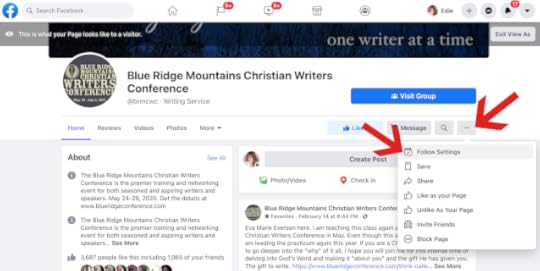

The Apple IOS Change and How it Affects Facebook
The second part of the changes coming to Facebook are driven by outside forces, initially by Apple, but others like Google are following close behind.
It used to be that Apple allowed Facebook and other apps to see your information as a default. Now it is reversing that and the default keeps your information private and for Facebook to gather outside data on you. It must request permission and you must give it.
This will primarily affect how it gathers information for those wishing to advertise on Facebook. All the information you share with Facebook will still be available, but secondary information will now be limited by who agrees to share that information.
I don’t often advertise on Facebook, so this will have little effect on me right now.
Bottom Line
Two things we need to keep clearly in mind.
First, there are always changes coming to social media in general and Facebook specifically. To navigate these sudden shifts, I keep a firm focus on my WHY. Why I am engaging on Facebook in the first place. When I keep my attention firmly on serving those I interact with, I find I can make it through the twists and turns caused by algorithms and other changes.
Second, remember that as believers who write, we know that God is ultimately in control of where our words go and who sees them. There is no power on heaven or earth that can thwart God’s plan.
Now it’s your turn. This is a lot of information to digest in one blog post. Share your questions and comments below and I’ll do my best to answer them!
Don’t forget to join the conversation!
Blessings,EdieTWEETABLE
 Edie Melson is a woman of faith with ink-stained fingers observing life through the lens of her camera. No matter whether she’s talking to writers, entrepreneurs, or readers, her first advice is always “Find your voice, live your story.” As an author, blogger, and speaker she’s encouraged and challenged audiences across the country and around the world. Her numerous books reflect her passion to help others develop the strength of their God-given gifts and apply them to their lives.Connect with her on her website, through Facebook, Twitter and on Instagram.
Edie Melson is a woman of faith with ink-stained fingers observing life through the lens of her camera. No matter whether she’s talking to writers, entrepreneurs, or readers, her first advice is always “Find your voice, live your story.” As an author, blogger, and speaker she’s encouraged and challenged audiences across the country and around the world. Her numerous books reflect her passion to help others develop the strength of their God-given gifts and apply them to their lives.Connect with her on her website, through Facebook, Twitter and on Instagram.
February 22, 2021
Dipping The Quill Deeper - Spontaneous Creativity for Writers #2

by Eva Marie Everson
Last month I encouraged you to write spontaneously, using a painting for inspiration. This is an activity I enjoy quite often and use to break writers block.
Let’s do it again! Here’s my take on a painting by Edoardo Tofano, titled “A Parisian Woman.” In a total of 301 words, I may have sparked an idea that will be written to completion . . . or I may simply encourage myself to further creativity on my WIP.
 Eudora wasn’t a beautiful young woman. Nor, could anyone say, she was remotely pretty. She had inherited her mother’s sharply pointed nose and her father’s angular jawline. Had she been born a male child, she may have passed for handsome, she sometimes thought as she gazed into the mirror of her vanity. Especially around the eyes and brow, the former wide and blue, the latter thick and aslant. But for all Mother Nature had not given her, God had blessed her with thick near-auburn tresses and a smooth complexion, although in the winter months peaches and cream often gave way to milky and pallid.
Eudora wasn’t a beautiful young woman. Nor, could anyone say, she was remotely pretty. She had inherited her mother’s sharply pointed nose and her father’s angular jawline. Had she been born a male child, she may have passed for handsome, she sometimes thought as she gazed into the mirror of her vanity. Especially around the eyes and brow, the former wide and blue, the latter thick and aslant. But for all Mother Nature had not given her, God had blessed her with thick near-auburn tresses and a smooth complexion, although in the winter months peaches and cream often gave way to milky and pallid.
Since the death of her mother, her father had insisted upon her wearing black to show a sign of respect in grieving. But it had been two years to the day now and Eudora was more than ready to shed her mourning clothes for more festive frocks. She would speak to him this evening, she decided, after they went to the church to say a prayer for Maman. For her soul, he said, because he feared for it. Eudora did not, of course. She knew her mother to be a saint. An absolute saint to have endured life with Père.
She dressed and readied herself early enough to escape the confines of the spacious but dark house located near the rue de la Paix. To stroll along the boulevard, to perhaps indulge in a coffee at her favorite café. And, if she so dared, to stop at her preferred street-side florist, and to beg for a cutting—just a small one—to wear upon the lapel of her dress. A splash of color might brighten the otherwise somber occasion within la Sainte Chapelle. It would infuriate her father, of course, but that simply could not be helped.
Now, it’s your turn. What would you do with this painting by Edoardo Tofano (Naples, 1838 - Rome, 1920)? Share with us . . . if you dare!
TWEETABLEDipping the Quill Deeper: spontaneous Creativity for Writers #2 - Eva Marie Everson on @EdieMelson (Click to Tweet)
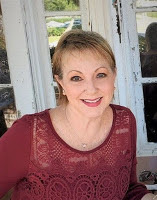 Eva Marie Everson is the president of Word Weavers International, the director of Florida Christian Writers Conference, and a frequent speaker at writers retreats across the United States. Her 40th title, DUST, a novel, will release in early March 2021.
Eva Marie Everson is the president of Word Weavers International, the director of Florida Christian Writers Conference, and a frequent speaker at writers retreats across the United States. Her 40th title, DUST, a novel, will release in early March 2021.
February 21, 2021
Four Ps on a Writer’s Journey

By Pat Nichols @PatNichols16
In 2015, after spending a year writing my first manuscript, I attended my first Christian writer’s conference. Talk about an eye-opener. While the workshops were informative and the networking delightful, the most valuable experience was Eva Marie Everson’s critique of my first three chapters. Her professional feedback made it clear my work wasn’t ready for primetime. At the same time her compliments and encouragement affirmed my decision to say goodbye to retirement and hello to career number two as an author.
My motto became, it’s never too late to follow your dreams. When dreams collide with God’s purpose something magical happens.
Four Ps on a Writer's Journey
PassionWebster’s Dictionary describes passion as intense, driving, or overmastering feeling or conviction. In Wake Up to the Word devotions, Joyce Meyers wrote: “if purpose is our journey and destination, then passion is the fuel that’s going to get us there.” For Christian authors, passion is inspired by the desire to fulfill God’s purpose and write from a Christian perspective.
While fueled by passion, I learned the road to publication is often long, arduous, and riddled with detours and disappointments. A lesson confirmed after experiencing my first rejections. More humbling moments. Fortunately, the desire to write kept my feet firmly planted on the path and inspired me to connect with other authors, attend conferences, and take online writing courses. My latest endeavor? Reading James Scott Bell’s Writing Unforgettable Characters. I learned some new techniques I’ll apply to my next project.
Devoting time to study is step one in the learning experience. What is step two?
PracticeI always enjoy watching gymnastics and ice skating during the Summer and the Winter Olympics. No matter how accomplished, the athletes rely on coaches for ongoing training while they devote countless hours to practicing their sport. Thus, the old cliché—practice makes perfect—fits. Earning a perfect score in an Olympic competition doesn’t mean the athlete won’t seek to improve. Although perfection is rarely reached striving to achieve it is a worthy goal.
For authors, that means writing. Every day. Whether a manuscript, devotion, blog, short story, or an article. When authors’ fingers race across keyboards or they scribe on paper, skills they’ve learned improve their writing.
Of course, there are times when doubt creeps in or writer’s block strikes. That’s when the third P is critical.
PersistenceWhen God places dreams in our hearts, He gives us the means to pursue what we’ve begun, no matter how big the mountain ahead seems. Accepting obstacles and disappointments as growth opportunities helps writers overcome doubt and persist. For example, submitting work to competitions that include critique provides valuable insight and growth opportunities. Critique groups and beta readers are equally important. Like athletes, successful authors stay the course. Which brings me to the last P.
Patience“Let us not become weary in doing good, for at the proper time we will reap a harvest if we do not give up.” Galatians 6:9
I admit after finishing that first manuscript, I expected immediate results. However, God in his infinite wisdom was preparing me for my journey. Preparation takes time. Think about those gymnasts and skaters who began training as young children. What seemed like instant success resulted from years of sacrifice and training. God didn’t open the door for my first publishing contract until I had spent three years practicing and preparing.
My message to pre-published authors? Keep your passion ignited and stay the course. Success will come when the timing is right.
TWEETABLEFour Ps on a Writer's Journey - @PatNichols16 for @AneMulligan on @EdieMelson (Click to Tweet)
 Pat Nichols draws on her experience in seven different management positions working with hundreds of amazing women from all walks of life to create stories about women facing tension-laced challenges and heart-warming triumphs in the pursuit of their dreams. Her debut novel, The Secret of Willow Inn, Willow Falls series book one, is a 2020 Selah Award winner. Book three, Starstruck in Willow Falls, is a NGCWC Georgia Peach Award winner. Pat lives in an Atlanta suburb with her husband as they continue to celebrate fifty-plus year marriage. She is the mother of two and grandmother of four. One precious granddaughter lives with the angels. She is grateful for God’s blessings and unfailing love through all of life’s peaks and valleys.
Pat Nichols draws on her experience in seven different management positions working with hundreds of amazing women from all walks of life to create stories about women facing tension-laced challenges and heart-warming triumphs in the pursuit of their dreams. Her debut novel, The Secret of Willow Inn, Willow Falls series book one, is a 2020 Selah Award winner. Book three, Starstruck in Willow Falls, is a NGCWC Georgia Peach Award winner. Pat lives in an Atlanta suburb with her husband as they continue to celebrate fifty-plus year marriage. She is the mother of two and grandmother of four. One precious granddaughter lives with the angels. She is grateful for God’s blessings and unfailing love through all of life’s peaks and valleys.
February 20, 2021
Tally On, Dear Writer

by Tammy Karasek @TickledPinkTam
I admit I’m an overachieving planner and organizer. I’m a queen list maker—even making lists of my lists. It’s probably more accurate to say I’m a big-dreamer or I’m unaware my lists are longer than a 24/7 schedule would allow to be completed. It could be said I’m a great example of someone desperately needing a recovery program for it. At times it has consumed me.
Often my lists have taunted me and caused me a bit of grief. Word counts not made, newsletters not done, posts not uploaded—all reasons I couldn’t put that coveted checkmark on the side of my list. Sometimes the list stares back at me as if to say, “See, you can’t do … All. The. Things.”
But due to that big thing that took over 2020, you know the one, I reassessed how I could plan my days and be able to see progress without the glaring examples of what I didn’t accomplish. I started doing tally marks. At the beginning of each week in my planner, I have a dedicated spot to mark tallies to better see the successes that have come.
That’s also where I look at the end of the week before I plan for the next week. I can see where the tally marks added up and it drove me to work harder on those lines that were a little weak. The topics are generic enough there’s truly an easy way to see success. Instead of my big projects, I see quick results. I see success in the little things that happened during the week on my writing journey.
Here’s an example of some of my topics:
I wrote, yay!I engaged in my Social Media.I read something to learn a new tip for writing.I encouraged another writer on their Social Media.I created a new graphic and saved it for an upcoming post.I cleaned out emails. I encouraged a writer to continue the work in their calling.As you can see by the list above, there is great opportunity to make those tally marks add up. In the past, I would write on my planner/checklist something like: write 1000 words each day. During certain times it wasn’t always possible to write 1000 words every day. I may have written 5,000, but three days in a row I wasn’t home. This left a line on my checklist without a check mark, looking as if I hadn’t been productive.I don’t know about you, but when I see those empty spots on my checklist, I go the wrong direction in my thinking. Those types of thoughts come too quick on how I can’t do this writing gig and I should let it go. Instead, by focusing on those smaller, achievable goals and looking at the amount of tally marks, it’s ramping up my stick-to-itive-ness. And I need that, especially this year.
In last month’s post, I spoke about giving oneself grace. This example of tally marks has been a great way for me to allow that to happen. I’m less likely to feel defeated and can rejoice in even the small victories, which add up to large successes when looked at together. It has been a great boost to my writing and an encouragement to me when I’m reaching out to other writers who might be feeling the lows in their writing journey as well.
My prayer for you, dear writer, is that you keep your tally marks continually full and you also look for ways to help other writers add tally marks to their life as well.
Tally on!
TWEETABLETally On, Dear Writer - @TickledPinkTam on @EdieMelson (Click to Tweet)
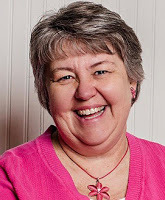 You’ll find Tammy using humor and wit to bring joy and hope to every aspect in life. She’s gone from down and defeated from a past filled with bullying and criticism from family to living a Tickled Pink life as she believes there is always a giggle wanting to come out! All because of HIM.
You’ll find Tammy using humor and wit to bring joy and hope to every aspect in life. She’s gone from down and defeated from a past filled with bullying and criticism from family to living a Tickled Pink life as she believes there is always a giggle wanting to come out! All because of HIM.She’s the Social Media Coordinator for the Blue Ridge Mountains Christian Writers Conference. President of ACFW Upstate SC, Past-President and current member of Word Weavers Upstate SC and Past-President of Cross N Pens Writers Group. She’s a member of My Book Therapy/Novel Academy. A writing team member for The Write Conversation, contributor for the Learn How to Write a Novel Blog and others. Published in the Divine Moments Compilation Book—Cool-inary Moments.
She’s married to her college sweetheart Larry, a mom to their grown daughter, Kristen and excited to add a son-in-law in 2021. Born and raised in Ohio, she now lives in South Carolina. Connect with Tammy at HTTPS://TAMMYKARASEK.COM.
February 19, 2021
How Do Writers Respond to Change?

by Emme Gannon @GannonEmme
In a world that is rapidly changing, we can easily lose our bearings. What grounded us may be gone. The thing that we could count on may be missing. We may feel like we’re floating with no safe place to land. We’re surrounded by loss. We thought our writing made a difference. Now we wonder.
Each moment of every day we are reacting to the thoughts that enter our minds. The events we experience go through the filter of our belief system which determines our reaction. Our brain then releases chemical messengers called neurotransmitters that communicate with our body and affects its function.
Good emotions like love and gratitude produce a surge of rewarding neurotransmitters which impart peace and tranquility. Negative emotions of hate and anger bring about adverse reactions that affect every part of who we are. The term, “You make me sick,” can often do just that.
Depression feeds on isolation which creates hopelessness. Fear increases when we are denied fellowship with one another. I think I can safely say that all of us have experienced some form of despondency over the restrictions placed on us by the pandemic along with the uncertainty of our times. Gathering, concerts, the theater—events that we once enjoyed are shadowed by leering dangers that affect life as we know it.
We need an emotional and spiritual adjustment to survive and that is not easily done. In fact, the only cure for despair is to cling to the Word and promises of God, who strengthens and gives guidance as we navigate perilous times.
The phrase, Prayer Changes Things is very true. Prayer produces actual changes in the volume of the brain’s grey matter, reducing anxiety and depression, as well as improving concentration and overall well being. Another positive is that prayer actually helps preserve the aging brain.
The only way we can navigate change is to trust God’s character and purposes in our lives and in the world in which we live. While fear is a normal response to change, yielding our lives moment by moment to God releases us from the tendency to despair. Remembering that God is sovereign and is for us, not against us, imparts faith as we pray. This attitude of prayer also opens the channel to hear His voice and His wisdom and direction for our lives at this moment in time.
While our life in a world that is falling apart may seem like a tiny branch on a large oak tree, our purpose is extraordinarily important. That branch intertwines with the others to produce the majesty of the mighty oak. Our words matter. Our writing matters. Our lives matter.
During the dark days of the pandemic and political upheaval, I planted a flowering almond tree in a sunny corner of my garden. I call it my tree of hope. God created that tree to bloom at a most inopportune time. When the January skies are dark and the winter winds strong, every branch of the flowering almond start to bud. Then, the most amazing thing happens. Against all odds, the buds open and cover the tree with frothy masses of pink blooms that send the fragrance of spicy-sweet cloves across the garden. Each flower is small but because there is an abundance, the winter garden takes on a pink glow. It is February and the flowers still bloom and announce hope. They bloom in spite of adverse conditions. Because that’s what God created them to do.
These strange and difficult times may seem like the winter of our soul, but we are wonderfully made by a God who has equipped us to live and create during each moment of the time He has allotted us on earth. He has prepared us for such a time as this. James 4:13-16 tells us, “Hold your plans loosely and leave room for God to adjust them.” When God closes a door, remain watchful for another to open.
Just like the flowering almond tree, there is a time to flower, but all is not lost when the flowers fall for the tree of hope is just going through another stage of development that will culminate in another rush of buds that will again open into a profusion of flowers. Because that’s what it was made to do. Our purpose was also planned by God long ago in perfect faithfulness. Rest in His sovereignty and His purposes, which are always for our good and have an eternal perspective.
TWEETABLEHow Do Writers Respond to Change? @GannonEmme on @EdieMelson (Click to Tweet)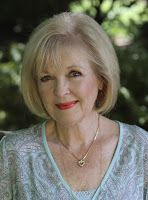 Emme Gannon is a wife, mother, and grandmother who loves to write stories that stir the heart. Her award-winning writing has appeared in Focus on the Family magazine, several anthologies, and numerous newsletters. She just completed her first novel.
Emme Gannon is a wife, mother, and grandmother who loves to write stories that stir the heart. Her award-winning writing has appeared in Focus on the Family magazine, several anthologies, and numerous newsletters. She just completed her first novel.
February 18, 2021
Do the Words We Write Matter?

by Crystal Bowman
With many different genes, there are countless ways our words can make a difference in the lives of others. When I was a stressed-out mom of three little ones, reading a chapter or two of a novel before I feel asleep provided a therapeutic escape from my mommy world. Books for children, teens, and adults can be entertaining, inspirational, educational, and many can bring readers to a deeper faith.
With books being translated into multiple languages and distributed globally, we will never know the full impact of our words. And maybe that’s a good thing, because then God gets the glory. But sometimes God gives us a glimpse into our writing ministry—a few words of affirmation from a reader to let us know that God is using what we write to bless and impact others. It’s just enough to encourage us in our calling to write, but not too much to inflate our egos.
How can we know if our words make difference?It may come through an Amazon review when someone says that your book was exactly what they needed to get through a difficult time. It might come from the contact form on your website—like the time a mom sent me an email to let me know her little girl learned to pray from one of my children’s books.You might get a message on social media from one of your biggest fans thanking you for writing your book. If you are a speaker, you might have a conversation with someone who enjoys your books. As a mentor for MOPS (Mothers of Preschoolers), I have opportunities to connect with mothers who read my books to their children. One mother shared that she didn’t know how to teach her children about God. She said that reading my children’s devotional books not only helped her teach her children about God, but that she was learning along with them.And sometimes God uses our words in ways we can never imagine.
In the summer of 2001, I wrote the curriculum for the fall semester of our women’s Bible study program. When the ministry director first asked me, I said no. She asked again and I said no. When she asked a third time I felt like Moses at the burning bush. I finally said yes.
From June through August I wrote lessons on the book of Joshua. It was hard, but I enjoyed it and learned a lot through the process. The stories of crossing the Jordan, sending spies into the land, and marching around Jericho were exciting. The more I wrote, the more I became absorbed in these stories.
I was excited for our first meeting. It would be a morning of orientation, assigning of groups, and passing out the lessons that were now printed and ready to go. As I was getting ready, I heard an announcement on the radio that an airplane had crashed into the north tower of the World Trade Center. I turned on the television and watched the second plane crash into the south tower. I trembled as I drove to church, not knowing what was happening.
The ladies arrived and we had our orientation meeting as planned. Then our women’s ministry director gave us an update and said the towers had tumbled down. We got on our knees and prayed. In the weeks that followed, I wept as I read the lessons—those words that God put on my heart to write. Here are two questions from the study:
1. Read Joshua 5:1: Now when all the Amorite kings west of the Jordan and all the Canaanite kings along the coast heard how the LORD had dried up the Jordan before the Israelites until they had crossed over, their hearts melted in fear and they no longer had the courage to face the Israelites.
What events today might cause our hearts to melt in fear?
2. Read Joshua 6:20: When the trumpets sounded, the army shouted, and at the sound of the trumpet, when the men gave a loud shout, the wall collapsed; so everyone charged straight in, and they took the city. ()How can we relate to walls falling down?
As I worked on those lesson in the summer of 2001, I did not know what was about to happen on September 11. But God knew.
Do the words we write matter? Yes, they do. TWEETABLEDo the Words We Write Matter? - encouragement from Crystal Bowman on @EdieMelson (Click to Tweet)
 Crystal Bowman is an award-winning, bestselling author of more than 100 books for children and four nonfiction books for women. She also writes lyrics for children’s piano music and is a monthly contributor to Clubhouse Jr. Magazine. She loves going to schools to teach kids about poetry. She also speaks at MOPS (Mothers of Preschoolers) groups and teaches workshops at writers’ conferences. When she is not writing or speaking, she enjoys going for walks, working out at the gym, and eating ice cream. She and her husband live in Michigan and have seven huggable grandkids. WWW.CRYSTALBOWMAN.COMWWW.FACEBOOK.COM/CRYSTAL.BOWMANWWW.FACEBOOK.COM/CRYSTALJBOWMANWWW.INSTAGRAM.COM/CRYSTALBOWMANAUTHOR
Crystal Bowman is an award-winning, bestselling author of more than 100 books for children and four nonfiction books for women. She also writes lyrics for children’s piano music and is a monthly contributor to Clubhouse Jr. Magazine. She loves going to schools to teach kids about poetry. She also speaks at MOPS (Mothers of Preschoolers) groups and teaches workshops at writers’ conferences. When she is not writing or speaking, she enjoys going for walks, working out at the gym, and eating ice cream. She and her husband live in Michigan and have seven huggable grandkids. WWW.CRYSTALBOWMAN.COMWWW.FACEBOOK.COM/CRYSTAL.BOWMANWWW.FACEBOOK.COM/CRYSTALJBOWMANWWW.INSTAGRAM.COM/CRYSTALBOWMANAUTHOR



